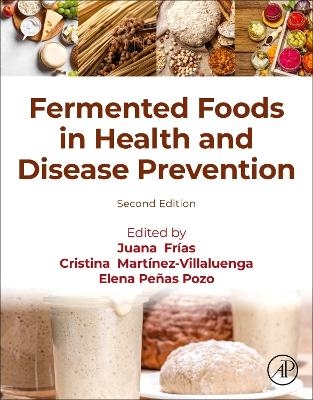
Fermented Foods in Health and Disease Prevention
Academic Press Inc (Verlag)
978-0-443-13899-7 (ISBN)
- Noch nicht erschienen (ca. Juni 2025)
- Versandkostenfrei innerhalb Deutschlands
- Auch auf Rechnung
- Verfügbarkeit in der Filiale vor Ort prüfen
- Artikel merken
This book will provide the food industry with new insights on the development of value-added fermentation, while also presenting nutritionists and dieticians with a useful resource to help them develop strategies to assist in the prevention of disease or to slow its onset and severity.
Juana Frias BSc, PhD is a Senior Research Scientist of the Spanish National Research Council (CSIC). She currently heads a team at the Institute of Food Science Technology and Nutrition, Madrid, Spain, carrying out research on the production and characterization of biologically active ingredients from plant food origin. Dr. Frias graduated in 1987 with an Honours Degree in Pharmacy Sciences and gained her PhD in 1992 with extraordinary award at University of Alcalá de Henares (Spain). In 2009, Dr. Frias became a Fellow of the Food Chemistry Division working party within the European Association for Chemical and Molecular Sciences (EuCheMS). In her career Dr. Frias has carried out research at the Food Research Institute and John Innes Institute (Norwich, UK), University of Life Sciences (Copenhagen, DK) and the Institute of Industrial Fermentation, CSIC (Madrid, ES). She has collaborated with research groups in Poland, United Kingdom, Finland, Denmark, Italy, Venezuela, Argentina, Peru, and USA. She is a leading expert on the grain legumes and their biotechnological processing to enhance nutritional and biofunctional properties and has a long standing interest in how functional ingredients affects health. Dr. Frias has published over 120 peer-reviewed manuscripts based on original research, has participated in national and international research projects, supervised Master students, PhD fellows and national and international research visitors. Cristina Martinez-Villaluenga is a senior scientist and member of the GRAINS4HEALTH research group at the Institute of Food Science, Technology, and Nutrition (ICTAN) of the Spanish National Research Council (CSIC). The mission of her research group is to develop new added-value products from grains (cereals, pseudocereals, and legumes) and give solutions to meet consumer and producer demands for food quality and safety, sustainability, and health. Bioactive compounds (including proteins and peptides) are the focus of her research. She has been involved in numerous Spanish, European, and International research projects. Elena Peñas BSc, PhD is a Research Scientist of the Institute of Food Science and Nutrition (ICTAN), Madrid, Spain, belonging to the Spanish National Research Council (CSIC). Her main research interests are aimed to develop and validate technological bioprocesses for improving the safety, quality and bioactivity of plant foods. A key part of her research activities is focused on the evaluation of the allergenic potential and health implications of novel bioactive food ingredients. Dr. Peñas obtained her bachelor’s degree in Biology in 2000 at Complutense University of Madrid and her PhD in 2006 at Autonoma University of Madrid (Spain). Dr. Peñas has performed her research career in different renowned European Research Institutions such as Institute of Instituto del Frio (Spain), Institute of Industrial Fermentations (Spain), Nizo Food Research (the Netherlands), University of Milan (Italy) and MTT Agrifood Research (Finland). Dr. Peñas is author of more than 40 peerreviewed articles and 4 book chapters, and she has participated in several research projects funded by National and International Public Institutions and private companies. She has given many invited lectures at University of Milan and has served as a mentor of undergraduate and graduate students and international researchers visitors.
1. Significance of fermented foods to public health in a sustainable world
2. Fermented foods targeting control and prevention of chronic diseases
3. The potential benefits of fermented food consumption in pregnancy and youth
4. The potential benefits of fermented food in elderly
5. The periodic table of fermented foods
6. Fermented foods and gut microbiome
7. Effect of fermentation on vitamin content in food
8. Bioactive peptides in fermented foods: production and evidence for health effects
9. Health benefits of exopolysaccharides in fermented foods
10. Biotransformation of phenolics by Lactiplantibacillus plantarum in fermented foods
11. Gamma-aminobutyric acid-enriched fermented foods
12. Fermented foods as a source of bacteriocins
13. Paraprobiotics and postbiotics in fermented foods
14. Fermented meat products and health
15. Fermented seafood products and health
16. Fermented cheese and their innovations
17. Yogurt, derivatives and health
18. Dairy kefir-derived products and their health effects
19. Beer and its role in human Health
20. Wine and health
21. Fermented pulses in nutrition and health promotion
22. The potential benefits of sourdough fermentation in bread making and health implications
23. Use of non-wheat flours in fermented foods
24. Soy-derived fermented foods and health implications
25. Kimchi and its health benefits
26. Fermented olives and health implications
27. Kombucha and other fermented teas
28. African fermented foods in an ethnomedicinal scenario
29. Sauerkraut: Production, composition, and health benefits
30. New sources of plant origin for fermented foods
31. Benefits and threats of the consumption of fermented foods
32. Biogenic amines in fermented foods and health implications
33. Reduction of food allergens and gluten by fermentation
34. Innovations in fermented foods: From waste to health
| Erscheint lt. Verlag | 1.6.2025 |
|---|---|
| Verlagsort | San Diego |
| Sprache | englisch |
| Maße | 216 x 276 mm |
| Themenwelt | Sachbuch/Ratgeber ► Gesundheit / Leben / Psychologie |
| Naturwissenschaften ► Biologie ► Mikrobiologie / Immunologie | |
| Technik ► Lebensmitteltechnologie | |
| ISBN-10 | 0-443-13899-0 / 0443138990 |
| ISBN-13 | 978-0-443-13899-7 / 9780443138997 |
| Zustand | Neuware |
| Informationen gemäß Produktsicherheitsverordnung (GPSR) | |
| Haben Sie eine Frage zum Produkt? |
aus dem Bereich


